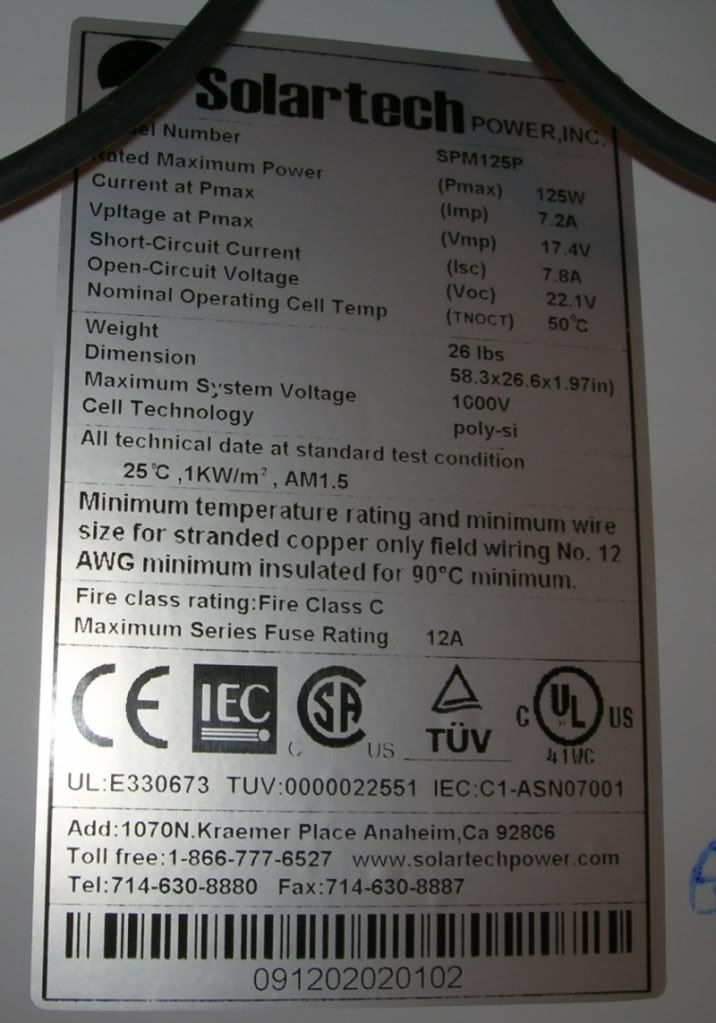
 |
|
|
#1 |
|
Lex Parsimoniae
Join Date: Feb 2009
Location: Woburn, MA
Posts: 4,918
Thanks: 114
Thanked 250 Times in 230 Posts
|
 Why use a fuse with this panel? it has a built in current limitation.. If I have a 10A fuse installed in series with the this panel, there is no way a short circuit at the load can cause more than 7.8 amps to flow.. This fuse is going to last forever. Should have just left it in it's box.. It sure seems like I wasted money on that fuse and fuse holder...  Comments? |
|
|

|
|
|
#2 |
|
Journeyman EcoRenovator
Join Date: May 2009
Location: Buffalo, NY
Posts: 344
Thanks: 3
Thanked 17 Times in 15 Posts
|
Since a fuse + holder costs <$0.25 at the OEM level, it's good practice to throw them in any kind of power source or transducer. I can't conceive of a situation where the fuse would come in to play, but that doesn't mean there isn't one. What if the panel breaks, or interacts with your other panels or inverter somehow? *shrug*
|
|
|

|
|
|
#3 |
|
Lex Parsimoniae
Join Date: Feb 2009
Location: Woburn, MA
Posts: 4,918
Thanks: 114
Thanked 250 Times in 230 Posts
|
My panels are connected to a big 10 ohm resistor.. So, they should be fine under normal circumstances.
Humm, maybe if lightning hit the array??  I guess if I hook up the panels to a cheap Chinese battery charger, there is a possibility of feedback from the batteries.. I sometimes rearrange my panels to run 35V at 14A, so I used a 20A fuse.. I've got a feeling that fuse is gonna be around many years after I'm gone.  |
|
|

|
|
|
#4 |
|
Master EcoRenovator
Join Date: Mar 2009
Location: Western Wisconsin.
Posts: 913
Thanks: 127
Thanked 82 Times in 71 Posts
|
I don't remember anything about installing a fuse on panels but you always want to have a disconnect switch between the panels and another between any other component so you can shut things down if there is a problem or you are doing work on the system.
|
|
|

|
|
|
#5 |
|
Lex Parsimoniae
Join Date: Feb 2009
Location: Woburn, MA
Posts: 4,918
Thanks: 114
Thanked 250 Times in 230 Posts
|
Look at the line above 'TUV' on the label in the pic above.
It seems to be saying to use a 12A fuse (or less.).?. Since that panel is NEVER going to put out 9 amps, why would you even have a fuse at all.?. I guess is would be good to have, if you didn't want to install a cut-off switch.. Just pull out the fuse when you want to work on things..  I think back to the dozens of solar installs that I've seen on youtube, almost all of them had fuses or circuit breakers.. If a panel is rated for 125 watts (under idea conditions), it's very unlikely that it's ever going to deliver 150 watts.. Maybe for a few seconds if the sun goes Nova..  |
|
|

|
|
|
#6 |
|
Apprentice EcoRenovator
Join Date: Jul 2010
Location: East Coast of Florida, USA
Posts: 149
Thanks: 2
Thanked 5 Times in 5 Posts
|
Suppose you screwed up and hooked it in series with a panel (or group of panels) that puts out 20 amps? The 12A fuse would blow and protect this panel?
|
|
|

|
|
|
#7 |
|
Master EcoRenovator
Join Date: Mar 2009
Location: Western Wisconsin.
Posts: 913
Thanks: 127
Thanked 82 Times in 71 Posts
|
Turns out the reason for the fuse is in case something back feeds back in to the panels, the disconnect switch should be inside where everything combines, or where your inverter or whatever is so if something goes wrong you can shut it down without burning your fingers off trying to pull a fuse.
|
|
|

|
|
|
#8 |
|
Lex Parsimoniae
Join Date: Feb 2009
Location: Woburn, MA
Posts: 4,918
Thanks: 114
Thanked 250 Times in 230 Posts
|
Feedback from a bad battery charger is the only thing I can think of..
But, I'm not sure that's going to blow a fuse.. I've looked at a few 48v output solar chargers and IIRC, they all specified a PV input, that was higher than 48v.. My point being, if the PV & Battery voltages are similar, there isn't going to be a big rush of current to pop the fuse.. However, if you had a Buck-boost charger with low PV input and high DC out to the batteries.?. Like if you had 14v of PV in and 48v on the batteries? And, the isolation diode failed (shorted), with a shorted series transistor (or locked in the ON state).. Yeah, that's a case where a fuse might save back-feed from getting out to your PV.. With that type setup, I would always use a fuse or breaker.. |
|
|

|
 |
|
|